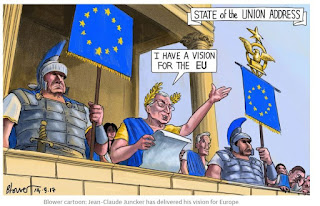but an earlier this week, How to reform today’s rigged capitalism , was like Hamlet without the Prince. It followed up on an earlier article , which focused on what he saw as the causes of rising inequality: falling productivity growth, stagnating innovation, rising debt levels and finanicization, concentrated corporate power, which in turn fosters rentierism and tax evasion. The officialdom has been shaken out of its Versailles 1788-level complacency by much-derided “populist” revolts, and more recently, 1848-like revolts, including a general strike in France. Yves Smith 10 December 2019 The End of Neoliberalism and the Rebirth of History Stiglitz September 24, 1599. In a timbered building off Moorgate Fields, not far from where Shakespeare was struggling to complete Hamlet , a new type of company was founded. Its ownership of the new firm, called the East India Company, was sliced into tiny pieces to be bought and sold freely. Imagining ...

